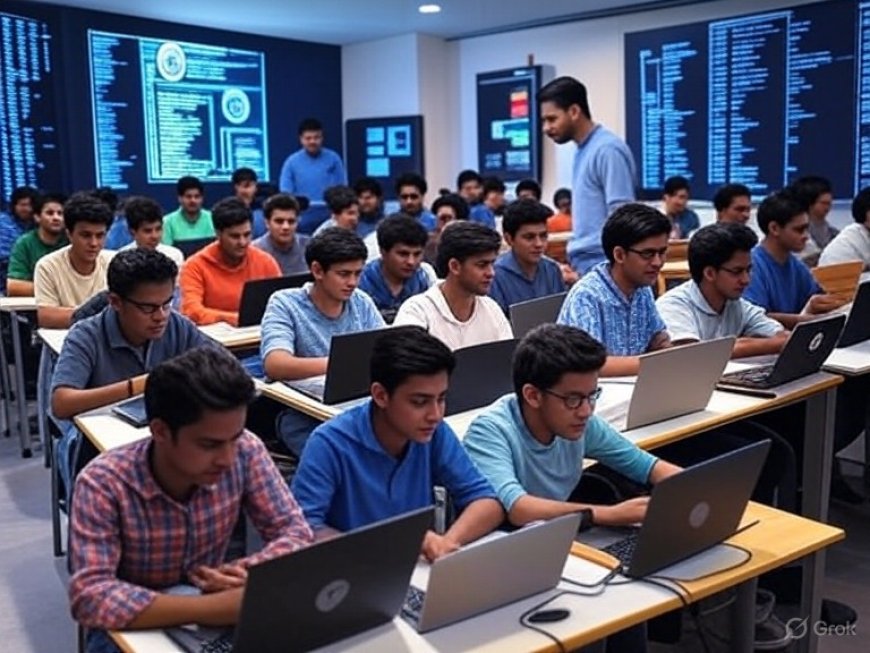Teen Ethical Hackers: How India’s Rising Bootcamps Are Grooming the Next-Gen Cyber Army
In Pune, Hyderabad and beyond, ethical hacking bootcamps tailored for 15–18‑year‑olds are proliferating, preparing teens for cybersecurity roles and helping fill India’s growing talent gap.

Across cities like Pune and Hyderabad, a new phenomenon is sweeping India’s tech-savvy youth: ethical hacking bootcamps designed specifically for teenagers. These 15–18-year-olds are not just coding—they are mastering penetration testing, Capture the Flag (CTF) challenges, and cybersecurity tools. As India wrestles with an evolving digital threat landscape, these coding classrooms are quietly laying the foundation for its next-generation cyber defence force.
Behind the Surge: What’s Driving the Trend?
1. Cybersecurity Talent Shortage
India faces a critical shortfall in cybersecurity professionals—estimates suggest over 1.5 million unfilled roles by 2025. This vacuum is spurring demand for early training pathways and pushes both private institutions and public initiatives to cultivate teenage talent ({{cite}}).
2. Youth Curiosity Meets Opportunity
From middle-schoolers tinkering on Termux apps to Class XII students building network exploits, teens are drawn to hacking’s blend of intellect and challenge. Many appreciate ethical hacking as a legal and constructive outlet intriguingly distinct from simple coding ({{cite}}).
3. Structured Bootcamps Tailored for Teens
Institutions like WebAsha Technologies in Pune offer summer bootcamps where students engage with tools like Kali Linux, Burp Suite, Watson, and poison Reverse engineering—beyond theory, into simulated real-world scenarios ({{cite}}). Bangalore’s RedTeam Hacker Academy has even launched an "Ethical Hacker Junior" program for ages 13–18, blending online and offline modules over 40 hours covering fundamentals and advanced hands-on labs ({{cite}}).
How the Bootcamps Operate
Curriculum & Format
Courses typically span 4–8 weeks, focusing on hands-on modules: network vulnerability scanning, Linux basics, port scanning, web app testing, password cracking, basic scripting, and CTF participation. Many culminate in mini-competitions judged on technical acumen ({{cite}}).
Certification & Competition
Recognized certifications like CEH (Certified Ethical Hacker), CompTIA PenTest+, or EC‑Council programs endorse foundational learning. Bootcamp graduates also compete in platforms or police-led CTF challenges, providing real validation of their abilities ({{cite}}, {{news}}).
Mentoring & Community
Experienced professionals—from security firms, academia, and national initiatives—mentor trainees, helping them build projects, connect to internship pipelines, and guiding career decisions. These mentors often include alumni of CyberPeace Foundation or National Security Database programs ({{cite}}).
Where Pune and Hyderabad Stand Out
Pune
Known for its thriving bootcamp ecosystem, Pune attracts teens from across Maharashtra. WebAsha’s summer program engages dozens of students in hands-on penetration and incident-response training, with structured placements in local small businesses and cybersecurity consultancies ({{cite}}).
Hyderabad
Home to strong defense ecosystem and tech startup culture, Hyderabad hosts academies with industry alliances, including campuses of The Hacking School—focusing on holistic hacker culture through modules in product dev, hardware hacking, and digital defense R‑and‑D labs ({{cite}}).
What Teens Gain
-
Foundational Skills: Mastery of tools and techniques from day one prepares teens for internships or foundational security roles.
-
Problem-Solving Aptitude: Hackathons and CTFs simulate real threats, building creativity and analytical thinking.
-
Career Path Visibility: Rather than aimless online learning, bootcamp alumni receive guidance on career tracks—from cybersec analyst through red-teaming to cyber diplomacy.
-
Community & Ethics: As training emphasises "white-hat" ethics, participants join a community that values legal standards and positive digital citizenship.
Broader Significance: India’s Youth Cyber Nexus
National Cybersecurity Strategy
Several government initiatives, including CERT‑In programs and CyberPeace Foundation hackathons, actively engage young talents to bridge security gaps. These bootcamp-trained teens may well feed into India’s national cyber workforce over the coming years ({{cite}}).
Industry Impact
With over 37% of businesses adopting cloud infrastructure and cyberattacks rising, companies are willing to hire early-career penetration testers. Many bootcamp graduates move into roles in MSSPs, startups, or local SOC teams ({{cite}}).
Societal Resilience
Police-led student programs—like Uttar Pradesh’s Amroha cyber camp training 500 teens in ethical hacking and OSINT—showcase how these youth engagement models can enhance community cyber awareness and defence readiness ({{cite}}).
Potential Challenges & Risks
-
Quality Assurance: A few unscrupulous academies make false promises; in Surat, some teens lost lakhs due to fraudulent bootcamp claims ({{news}}).
-
Mental Health & Pressure: Intense competition and glorifying hacking culture can drive burnout unless balanced with ethics and wellbeing training.
-
Legal Awareness: Without strong focus on ethical boundaries, curious teens may accidentally cross into gray areas. Workshops run by Kolkata police emphasize this critical distinction ({{cite}}).
What Experts Recommend
To maintain momentum and ensure impact:
-
Accredited Standards: Programs should align with certification frameworks like CEH or CompTIA alongside code-of-conduct policies.
-
Mentorship Ecosystems: Trauma-informed mentors, legal training, and career support help steer youth safely.
-
Public-Private Coordination: Government agencies, universities, and nonprofits should expand hackathon collaborations and skill scholarships.
-
Diversity & Inclusion: Encourage more female and rural teen participation, ensuring equitable cyber education across communities.
Conclusion: From Bootcamp to Cyber Army
Ethical hacking bootcamps in cities like Pune and Hyderabad are not just training teens—they are weaving together a grassroots cyber defence ecosystem. By harnessing curiosity, competitive spirit, and technical education, these initiatives are cultivating a decentralized next-generation cadre of cyber talent.
As India scales its digital infrastructure—from smart cities to national cloud networks—this pool of young ethical hackers could become the silent guardians of its online economy and institutions. The rise of teen hacking schools is more than a trend—it’s the vanguard of India’s cyber resilience strategy.



















































